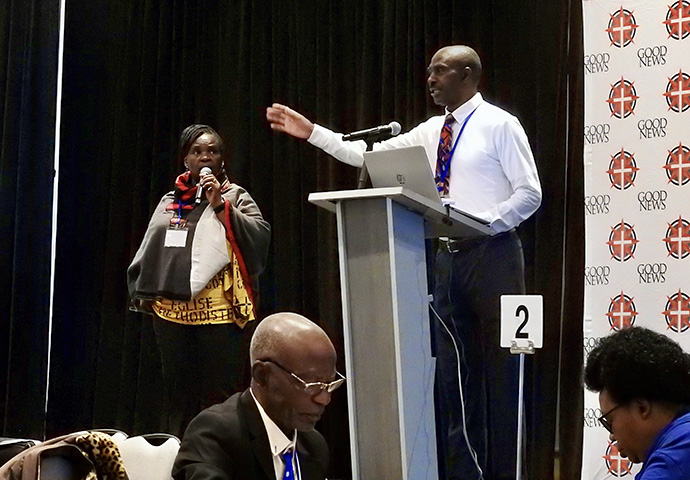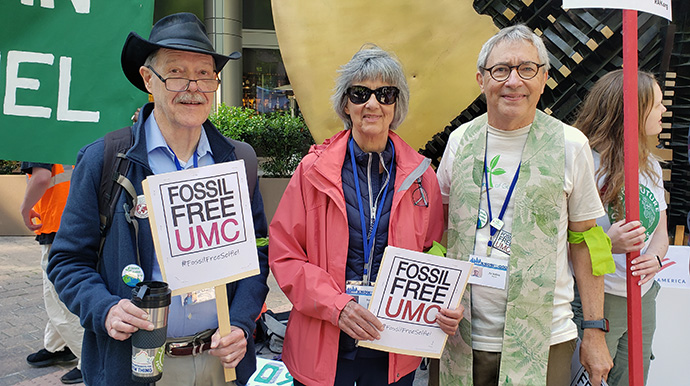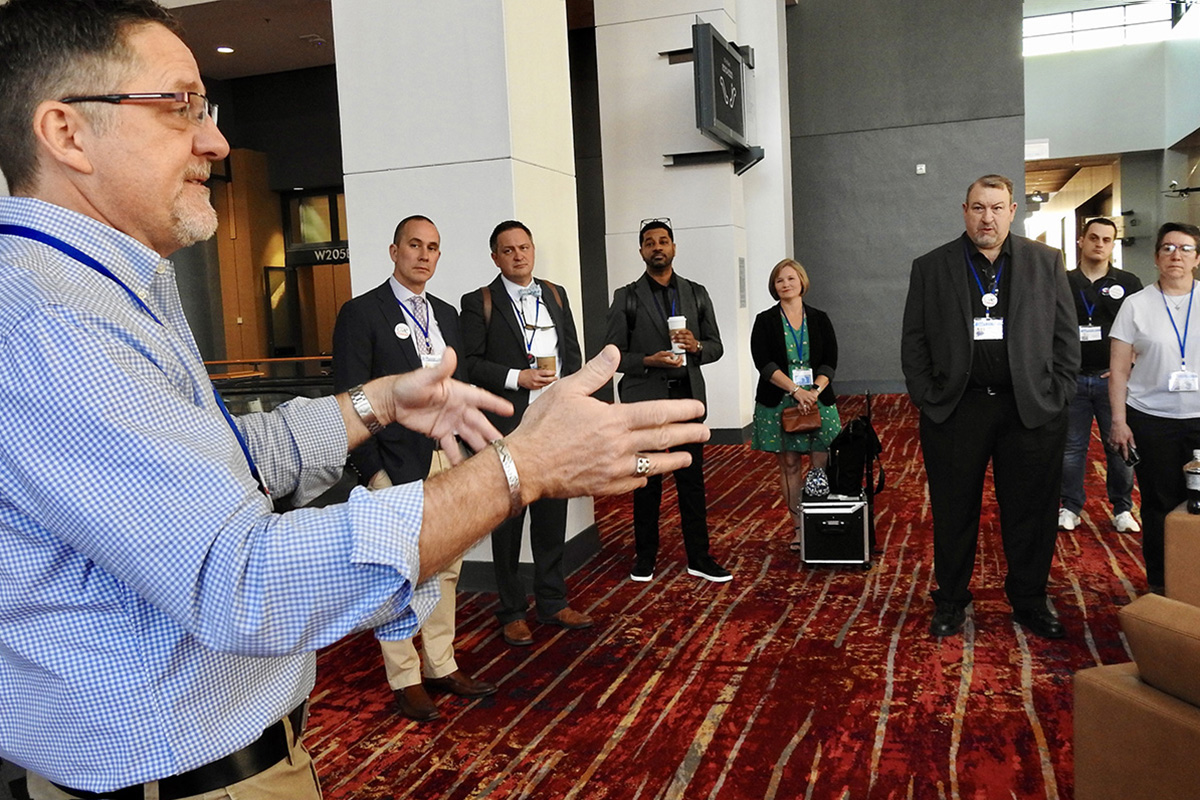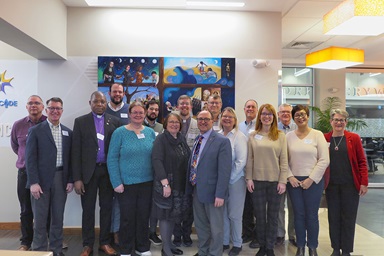Key points:
- Groups trying to influence legislation and raise awareness about causes they care about are busy on the periphery of General Conference.
- Events include legislative breakfasts, early morning briefings and street protests.
- Mainstream UMC and Good News are among the groups holding separate events, lobbying on different sides of regionalization.
On the periphery of the United Methodist General Conference, groups are busy every day, trying to influence legislation and raise awareness about causes they believe in passionately.
Mainstream UMC — committed to regionalization, removal of language restricting full LGBTQ participation in the denomination and revision of the Social Principles — huddles each morning at 7:30 at the Charlotte Convention Center, where General Conference is underway.
On April 25, about 20 people gathered in an upstairs lobby, led by the Rev. Mark Holland, for prayer and a cappella singing of the hymns “I Am the Church,” “Be Thou My Vision” and “O for a Thousand Tongues to Sing.” They got a briefing on regionalization legislation, which they strongly support, then wrapped up with a plea from Holland.
“If you want (Mainstream UMC) buttons, or know people who want buttons, even if you don’t want to take buttons, I want you to take buttons,” he said.
Good News, the traditionalist caucus, is known for holding legislative breakfasts most days of General Conference. But this year, with many of its members having left The United Methodist Church through disaffiliation, there are just two such events.
The first, held at a hotel near the convention center on April 24, drew a crowd of about 100 — smaller than at General Conferences past. The talk was against regionalization and in favor of creating new disaffiliation options for annual conferences outside the United States.
The Rev. Rob Renfroe, president of Good News, referred in his remarks to Council of Bishops President Thomas J. Bickerton’s address at the beginning of General Conference. Bickerton had said that those not committed to helping The United Methodist Church go forward should consider leaving the convention hall.
OK, Renfroe countered, but extend disaffiliation options to make that possible.
“It’s like being in a prison cell and the head of the prison says, ‘If you don’t like it, leave,’” Renfroe said.

Simon Mafunda, an observer from Zimbabwe and a vice president of the traditionalist group Wesleyan Covenant Association, gave the devotional and afterward said he, too, felt General Conference should ease the way for African United Methodists who want to disaffiliate.
“Even if there’s one who wants to leave, give them that opportunity,” he said.
Fossil Free UMC is a caucus favoring divestment of fossil fuel company stocks by Wespath, the denomination’s pension and benefits agency, and other United Methodist institutions. Wespath has a number of environmental sustainability initiatives but opposes divestment. The agency says it can have more influence by staying invested in fossil fuel companies and — with large investor allies — pushing them toward low-carbon strategies.

General Conference photos
On April 23, Fossil Free UMC joined other environmental groups in a protest at Bank of America headquarters in Charlotte, ahead of a meeting by the bank’s stockholders. Retired Bishop Hope Morgan Ward demonstrated with fellow United Methodists. The Fossil Free UMC group also joined other United Methodists at an April 22 Earth Day service at First United Methodist Church in Charlotte.
The Rev. Pat Watkins, a Virginia Conference elder, spoke during the protest about the need to divest from fossil fuel companies and from large banks that enable those companies.
Working to minimize global warming — through divestment — should be a faith issue for United Methodists, he said at the convention center two days later.
“The Bible is clear that we’re to take care of creation and each other,” he told UM News. “Because fossil fuels are the reason we have climate change, we want to transition to more sustainable forms of energy in an effort to just simply take care of people and the planet.”

Love Your Neighbor Coalition and Reconciling Ministries Network are among the groups that have booths in the convention center exhibition hall during General Conference. So does United Methodists for Kairos Response, which planned a demonstration on behalf of Palestine at the close of General Conference business on April 25.
Mission Together is an informal group of United Methodists in the U.S. who have in recent years traveled to Congo and the Philippines to build relationships and prepare for General Conference.
“The two words we heard the most in our conversations with our central conference friends were ‘mission together,’ so that’s what we decided to name our group,” said the Rev. Rob Spencer of the North Texas Conference. “It’s a bunch of Methodist pastors and laypeople who love the worldwide church.”
Mission Together is hosting evening events April 25 and 26 at Myers Park United Methodist Church in Charlotte. The first will be for United Methodists from Congo and the second for United Methodists from the Philippines.
The plan is to share a meal and enjoy being together, but there were will be pro-regionalization discussion as well.
“It will be a light touch,” Spencer promised.
Hodges is a Dallas-based writer for United Methodist News. Contact him at 615-742-5470 or [email protected]. To read more United Methodist news, subscribe to the free Daily or Weekly Digests.




